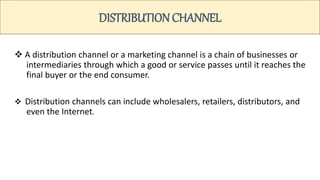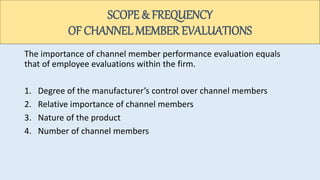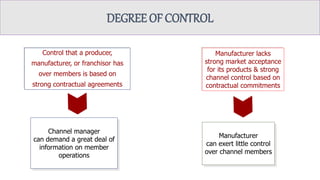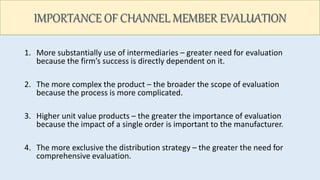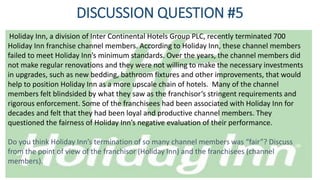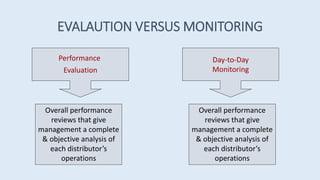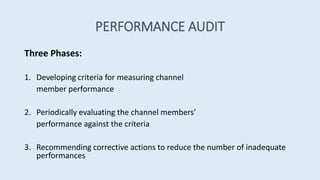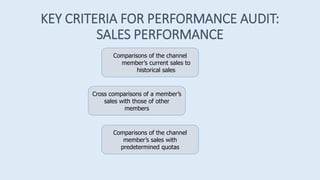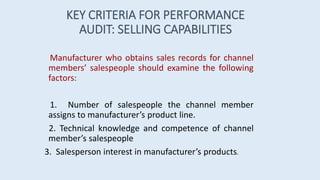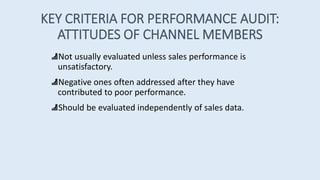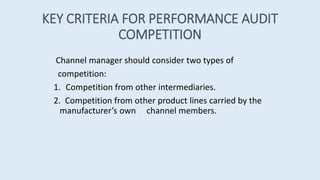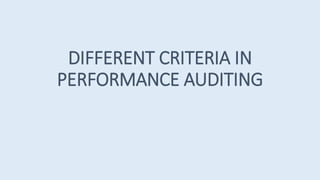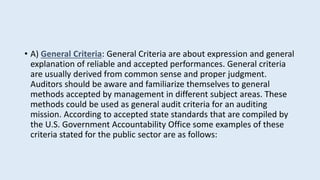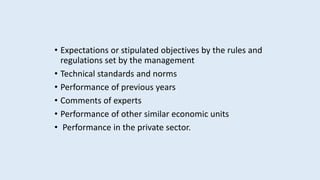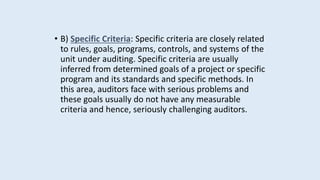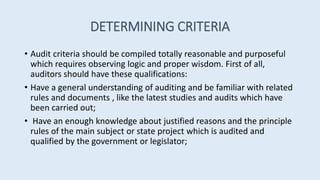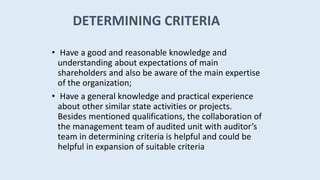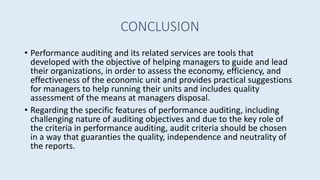Evalauating channel member performance
- 1. EVALUATING CHANNEL MEMBER PERFORMANCE PRESENTED BY SOUGATA SARKAR SIDDHARTHA DAS DAVID SEHLAMGOU THANGEW PRATIK PURKHAYASTRA
- 2. DISTRIBUTION CHANNEL ’üČ A distribution channel or a marketing channel is a chain of businesses or intermediaries through which a good or service passes until it reaches the final buyer or the end consumer. ’üČ Distribution channels can include wholesalers, retailers, distributors, and even the Internet.
- 3. SCOPE & FREQUENCY OF CHANNEL MEMBER EVALUATIONS The importance of channel member performance evaluation equals that of employee evaluations within the firm. 1. Degree of the manufacturerŌĆÖs control over channel members 2. Relative importance of channel members 3. Nature of the product 4. Number of channel members
- 4. DEGREE OF CONTROL Control that a producer, manufacturer, or franchisor has over members is based on strong contractual agreements Manufacturer lacks strong market acceptance for its products & strong channel control based on contractual commitments Channel manager can demand a great deal of information on member operations Manufacturer can exert little control over channel members
- 5. IMPORTANCE OF CHANNEL MEMBER EVALUATION 1. More substantially use of intermediaries ŌĆō greater need for evaluation because the firmŌĆÖs success is directly dependent on it. 2. The more complex the product ŌĆō the broader the scope of evaluation because the process is more complicated. 3. Higher unit value products ŌĆō the greater the importance of evaluation because the impact of a single order is important to the manufacturer. 4. The more exclusive the distribution strategy ŌĆō the greater the need for comprehensive evaluation.
- 6. DISCUSSION QUESTION #5 Holiday Inn, a division of Inter Continental Hotels Group PLC, recently terminated 700 Holiday Inn franchise channel members. According to Holiday Inn, these channel members failed to meet Holiday InnŌĆÖs minimum standards. Over the years, the channel members did not make regular renovations and they were not willing to make the necessary investments in upgrades, such as new bedding, bathroom fixtures and other improvements, that would help to position Holiday Inn as a more upscale chain of hotels. Many of the channel members felt blindsided by what they saw as the franchisorŌĆÖs stringent requirements and rigorous enforcement. Some of the franchisees had been associated with Holiday Inn for decades and felt that they had been loyal and productive channel members. They questioned the fairness of Holiday InnŌĆÖs negative evaluation of their performance. Do you think Holiday InnŌĆÖs termination of so many channel members was ŌĆ£fairŌĆØ? Discuss from the point of view of the franchisor (Holiday Inn) and the franchisees (channel members).
- 7. EVALAUTION VERSUS MONITORING Performance Evaluation Day-to-Day Monitoring Overall performance reviews that give management a complete & objective analysis of each distributorŌĆÖs operations Overall performance reviews that give management a complete & objective analysis of each distributorŌĆÖs operations
- 8. PERFORMANCE AUDIT Three Phases: 1. Developing criteria for measuring channel member performance 2. Periodically evaluating the channel membersŌĆÖ performance against the criteria 3. Recommending corrective actions to reduce the number of inadequate performances
- 9. KEY CRITERIA FOR PERFORMANCE AUDIT: SALES PERFORMANCE Comparisons of the channel memberŌĆÖs current sales to historical sales Cross comparisons of a memberŌĆÖs sales with those of other members Comparisons of the channel memberŌĆÖs sales with predetermined quotas
- 10. KEY CRITERIA FOR PERFORMANCE AUDIT 1. Total level of channel memberŌĆÖs inventory 2. Shelf or floor space devoted to inventory 3. Shelf or floor space provided relative to competitorsŌĆÖ inventory 4. Breakdown by particular products in units & dollars 5. Comparison of figures with channel membersŌĆÖ estimated purchases of related & competitive lines 6. Condition of inventory & inventory facilities 7. Amount of old stock on hand & efforts made to move it 8. Adequacy of channel memberŌĆÖs inventory control & record-keeping system
- 11. KEY CRITERIA FOR PERFORMANCE AUDIT: SELLING CAPABILITIES Manufacturer who obtains sales records for channel membersŌĆÖ salespeople should examine the following factors: 1. Number of salespeople the channel member assigns to manufacturerŌĆÖs product line. 2. Technical knowledge and competence of channel memberŌĆÖs salespeople 3. Salesperson interest in manufacturerŌĆÖs products.
- 12. KEY CRITERIA FOR PERFORMANCE AUDIT: ATTITUDES OF CHANNEL MEMBERS Not usually evaluated unless sales performance is unsatisfactory. Negative ones often addressed after they have contributed to poor performance. Should be evaluated independently of sales data.
- 13. KEY CRITERIA FOR PERFORMANCE AUDIT COMPETITION Channel manager should consider two types of competition: 1. Competition from other intermediaries. 2. Competition from other product lines carried by the manufacturerŌĆÖs own channel members.
- 14. DIFFERENT CRITERIA IN PERFORMANCE AUDITING
- 15. ŌĆó A) General Criteria ŌĆó B) Specific Criteria CRITERIAS
- 16. ŌĆó A) General Criteria: General Criteria are about expression and general explanation of reliable and accepted performances. General criteria are usually derived from common sense and proper judgment. Auditors should be aware and familiarize themselves to general methods accepted by management in different subject areas. These methods could be used as general audit criteria for an auditing mission. According to accepted state standards that are compiled by the U.S. Government Accountability Office some examples of these criteria stated for the public sector are as follows:
- 17. ŌĆó Expectations or stipulated objectives by the rules and regulations set by the management ŌĆó Technical standards and norms ŌĆó Performance of previous years ŌĆó Comments of experts ŌĆó Performance of other similar economic units ŌĆó Performance in the private sector.
- 18. ŌĆó B) Specific Criteria: Specific criteria are closely related to rules, goals, programs, controls, and systems of the unit under auditing. Specific criteria are usually inferred from determined goals of a project or specific program and its standards and specific methods. In this area, auditors face with serious problems and these goals usually do not have any measurable criteria and hence, seriously challenging auditors.
- 19. DETERMINING CRITERIA ŌĆó Audit criteria should be compiled totally reasonable and purposeful which requires observing logic and proper wisdom. First of all, auditors should have these qualifications: ŌĆó Have a general understanding of auditing and be familiar with related rules and documents , like the latest studies and audits which have been carried out; ŌĆó Have an enough knowledge about justified reasons and the principle rules of the main subject or state project which is audited and qualified by the government or legislator;
- 20. ŌĆó Have a good and reasonable knowledge and understanding about expectations of main shareholders and also be aware of the main expertise of the organization; ŌĆó Have a general knowledge and practical experience about other similar state activities or projects. Besides mentioned qualifications, the collaboration of the management team of audited unit with auditorŌĆÖs team in determining criteria is helpful and could be helpful in expansion of suitable criteria DETERMINING CRITERIA
- 21. CONCLUSION ŌĆó Performance auditing and its related services are tools that developed with the objective of helping managers to guide and lead their organizations, in order to assess the economy, efficiency, and effectiveness of the economic unit and provides practical suggestions for managers to help running their units and includes quality assessment of the means at managers disposal. ŌĆó Regarding the specific features of performance auditing, including challenging nature of auditing objectives and due to the key role of the criteria in performance auditing, audit criteria should be chosen in a way that guaranties the quality, independence and neutrality of the reports.

